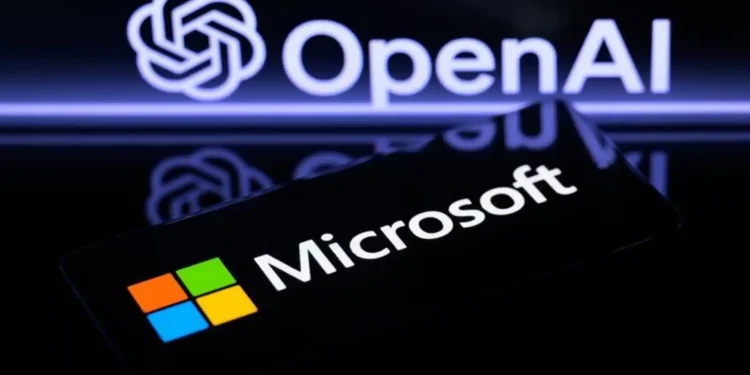Microsoft and OpenAI announced the long-awaited details of their new partnership agreement Tuesday morning, with concessions on both sides that keep the companies aligned but not in lockstep as they move into their next phases of AI development.
Under the arrangement, Microsoft gets a 27% equity stake in OpenAI’s new for-profit entity, the OpenAI Group PBC (Public Benefit Corporation), a stake valued at approximately $135 billion. That’s a decrease from 32.5% equity but not a bad return on an investment of $13.8 billion.
At the same time, OpenAI has contracted to purchase an incremental $250 billion in Microsoft Azure cloud services. However, in a significant concession in return for that certainty, Microsoft will no longer have a “right of first refusal” on new OpenAI cloud workloads.
Microsoft, meanwhile, will retain its intellectual property rights to OpenAI models and products through 2032, an extension of the timeframe that existed previously.
A key provision of the new agreement centers on Artificial General Intelligence (AGI), with any declaration of AGI by OpenAI now subject to verification by an independent expert panel. This was a sticking point in the earlier partnership agreement, with an ambiguous definition of AGI potentially triggering new provisions of the prior arrangement.
Microsoft and OpenAI had previously announced a tentative agreement without providing details. More aspects of the deal are disclosed in a joint blog post from the companies.
Shares of Microsoft are up 2% in early trading after the announcement. The company reports earnings Wednesday afternoon, and some analysts have said the uncertainty over the OpenAI arrangement has been impacting Microsoft’s stock.
The 27% Microsoft equity stake in OpenAI Group PBC valued at $135 billion represents massive appreciation from the $13.8 billion investment, generating nearly tenfold paper returns that validate the Redmond company’s early bet on generative AI.
The decrease from 32.5% to 27% equity suggests OpenAI diluted Microsoft’s ownership through additional investment rounds or structural changes converting the nonprofit into a Public Benefit Corporation, reducing Microsoft’s control while maintaining substantial influence.
The $250 billion Azure cloud services commitment over an unspecified timeframe represents enormous guaranteed revenue for Microsoft’s cloud division, potentially spanning years and ensuring OpenAI remains tied to Azure infrastructure rather than migrating to competitors like Amazon Web Services or Google Cloud.
The relinquished “right of first refusal” on new OpenAI cloud workloads marks significant concession where Microsoft surrenders automatic priority for OpenAI’s computing needs, allowing the AI company to potentially use other cloud providers for specific projects or capacity needs.
The intellectual property rights retention through 2032 provides Microsoft decade-long licensing to OpenAI models and products, enabling continued integration of GPT technology into Windows, Office, GitHub, and other Microsoft products regardless of future partnership changes.
The 2032 IP rights extension beyond previous agreements protects Microsoft’s AI strategy even if the partnership deteriorates, ensuring the company can continue offering Copilot and other AI features without renegotiating model access.
The Artificial General Intelligence verification requirement by independent expert panel addresses previous ambiguity where OpenAI could unilaterally declare AGI achievement, potentially triggering contract provisions limiting Microsoft’s access or altering financial arrangements.
The AGI definition ambiguity as a “sticking point” reflects fundamental uncertainty about what constitutes human-level artificial intelligence, with disagreement about whether current large language models approach AGI or remain narrow AI despite impressive capabilities.
The independent expert panel verification prevents OpenAI from strategically declaring AGI to escape partnership obligations, requiring external validation that genuine breakthrough occurred rather than incremental improvement marketed as transformative leap.
The tentative agreement announcement without details followed by Tuesday’s disclosure suggests intense negotiations continued after the initial framework, with lawyers refining equity percentages, IP rights, and AGI verification mechanisms.
The 2% Microsoft share price increase following the announcement indicates investor relief that partnership uncertainty resolved favorably, with the $250 billion Azure commitment and retained IP rights reassuring markets about Microsoft’s AI strategy sustainability.
The Wednesday afternoon earnings report timing means Microsoft executives can address analyst questions about the OpenAI arrangement during the call, providing context about how the $250 billion commitment flows into revenue projections.
The analyst commentary that OpenAI arrangement uncertainty impacted Microsoft’s stock reflects Wall Street’s concern that partnership dissolution could undermine the company’s AI competitive position against Google, Amazon, and other tech giants racing to monetize generative AI.
The Public Benefit Corporation structure for OpenAI Group represents corporate form balancing profit motives with social mission, theoretically prioritizing AI safety and beneficial outcomes alongside shareholder returns, though skeptics question whether the designation imposes meaningful constraints.
The joint blog post disclosure method allows both companies to control messaging rather than responding to media inquiries, presenting the restructured partnership as mutual success rather than negotiation where one party extracted more favorable terms.
Seattle-area implications include continued Microsoft investment in its Redmond campus and Washington state operations as Azure expansion supports the $250 billion OpenAI commitment, potentially creating thousands of data center jobs and infrastructure investments.
The partnership restructuring affects Seattle’s technology ecosystem where Microsoft and Amazon compete for AI talent, with the OpenAI arrangement’s stability influencing whether top researchers choose Microsoft or rivals developing competing large language models.
Washington state tax revenues benefit from Microsoft’s AI success, with the $135 billion OpenAI stake valuation increasing the company’s overall worth and generating capital gains taxes when shares eventually sell, plus sales taxes from Azure services OpenAI purchases.
The arrangement’s impact on Seattle startups includes potential acquisition opportunities where Microsoft deploys OpenAI-powered tools to evaluate and purchase local AI companies, integrating their capabilities into the expanding Microsoft AI ecosystem.







